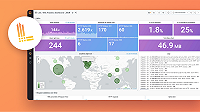This is documentation for the next version of Grafana Alloy Documentation. For the latest stable release, go to the latest version.
otelcol.exporter.prometheus
otelcol.exporter.prometheus accepts OTLP-formatted metrics from other otelcol components, converts metrics to Prometheus-formatted metrics, and forwards the resulting metrics to prometheus components.
Note
otelcol.exporter.prometheusis a custom component unrelated to theprometheusexporter from OpenTelemetry Collector.Conversion of metrics are done according to the OpenTelemetry Metrics Data Model specification.
You can specify multiple otelcol.exporter.prometheus components by giving them different labels.
Usage
otelcol.exporter.prometheus "<LABEL>" {
forward_to = [...]
}Arguments
You can use the following arguments with otelcol.exporter.prometheus:
By default, OpenTelemetry resources are converted into target_info metrics.
OpenTelemetry instrumentation scopes are converted into otel_scope_info metrics.
Set the include_scope_info and include_target_info arguments to false, respectively, to disable the custom metrics.
Warning
EXPERIMENTAL: The
honor_metadataargument is an experimental feature. If you enable this argument, resource consumption may increase, particularly if you ingest many metrics with different names. Some downstream components aren’t compatible with Prometheus metadata. The following components are compatible:
otelcol.receiver.prometheusprometheus.remote_writeonly when configured for Remote Write v2.prometheus.write_queue
When include_scope_labels is true the otel_scope_name and otel_scope_version labels are added to every converted metric sample.
When include_target_info is true, OpenTelemetry Collector resources are converted into target_info metrics.
Note
OTLP metrics can have a lot of resource attributes. Setting
resource_to_telemetry_conversiontotruewould convert all of them to Prometheus labels, which may not be what you want. Instead of usingresource_to_telemetry_conversion, most users need to useotelcol.processor.transformto convert OTLP resource attributes to OTLP metric datapoint attributes before usingotelcol.exporter.prometheus. Refer to Create Prometheus labels from OTLP resource attributes for an example.
Blocks
You can use the following blocks with otelcol.exporter.prometheus:
debug_metrics
The debug_metrics block configures the metrics that this component generates to monitor its state.
The following arguments are supported:
disable_high_cardinality_metrics is the Alloy equivalent to the telemetry.disableHighCardinalityMetrics feature gate in the OpenTelemetry Collector.
It removes attributes that could cause high cardinality metrics.
For example, attributes with IP addresses and port numbers in metrics about HTTP and gRPC connections are removed.
Note
If configured,
disable_high_cardinality_metricsonly applies tootelcol.exporter.*andotelcol.receiver.*components.
Exported fields
The following fields are exported and can be referenced by other components:
input accepts otelcol.Consumer data for metrics. Other telemetry signals are ignored.
Metrics sent to the input are converted to Prometheus-compatible metrics and are forwarded to the forward_to argument.
The following are dropped during the conversion process:
- Metrics that use the delta aggregation temporality.
Note
Prometheus doesn’t natively support delta metrics. If your Alloy instance ingests delta OTLP metrics, you can convert them to cumulative OTLP metrics with
otelcol.processor.deltatocumulativebefore you useotelcol.exporter.prometheus.
Component health
otelcol.exporter.prometheus is only reported as unhealthy if given an invalid configuration.
Debug information
otelcol.exporter.prometheus doesn’t expose any component-specific debug information.
Example
Basic usage
This example accepts metrics over OTLP and forwards it using prometheus.remote_write:
otelcol.receiver.otlp "default" {
grpc {}
output {
metrics = [otelcol.exporter.prometheus.default.input]
}
}
otelcol.exporter.prometheus "default" {
forward_to = [prometheus.remote_write.mimir.receiver]
}
prometheus.remote_write "mimir" {
endpoint {
url = "http://mimir:9009/api/v1/push"
}
}Create Prometheus labels from OTLP resource attributes
This example uses otelcol.processor.transform to add extra key1 and key2 OTLP metric datapoint attributes from the key1 and key2 OTLP resource attributes.
otelcol.exporter.prometheus then converts key1 and key2 to Prometheus labels along with any other OTLP metric datapoint attributes.
This avoids the need to set resource_to_telemetry_conversion to true, which could have created too many unnecessary metric labels.
otelcol.receiver.otlp "default" {
grpc {}
output {
metrics = [otelcol.processor.transform.default.input]
}
}
otelcol.processor.transform "default" {
error_mode = "ignore"
metric_statements {
context = "datapoint"
statements = [
`set(attributes["key1"], resource.attributes["key1"])`,
`set(attributes["key2"], resource.attributes["key2"])`,
]
}
output {
metrics = [otelcol.exporter.prometheus.default.input]
}
}
otelcol.exporter.prometheus "default" {
forward_to = [prometheus.remote_write.mimir.receiver]
}
prometheus.remote_write "mimir" {
endpoint {
url = "http://mimir:9009/api/v1/push"
}
}Compatible components
otelcol.exporter.prometheus can accept arguments from the following components:
- Components that export Prometheus
MetricsReceiver
otelcol.exporter.prometheus has exports that can be consumed by the following components:
- Components that consume OpenTelemetry
otelcol.Consumer
Note
Connecting some components may not be sensible or components may require further configuration to make the connection work correctly. Refer to the linked documentation for more details.



